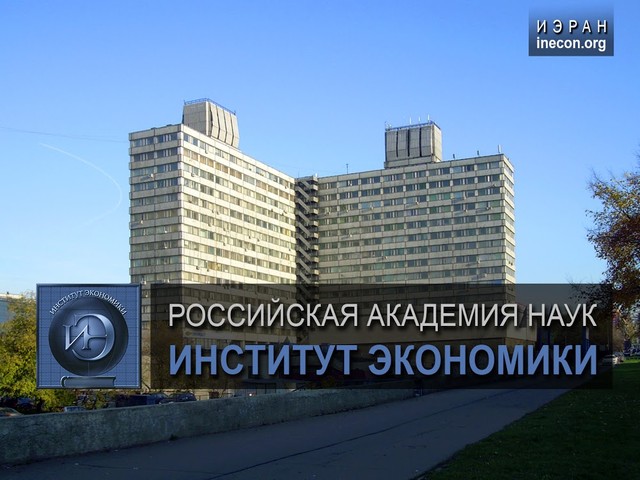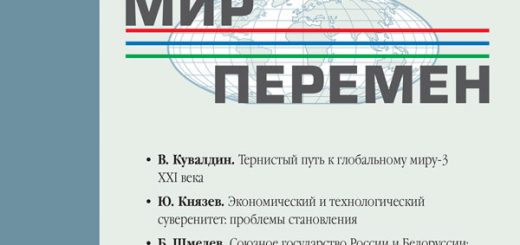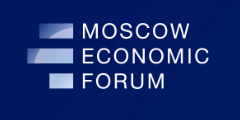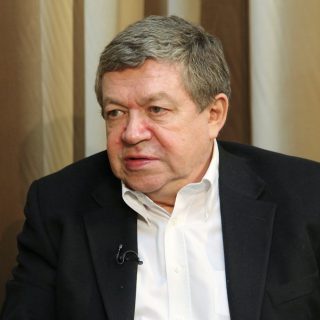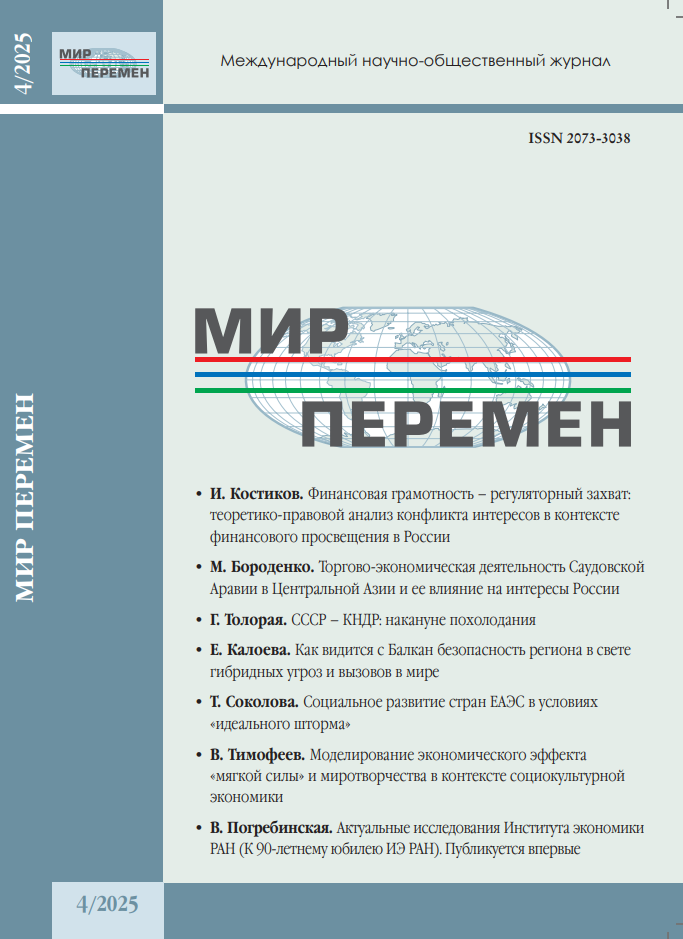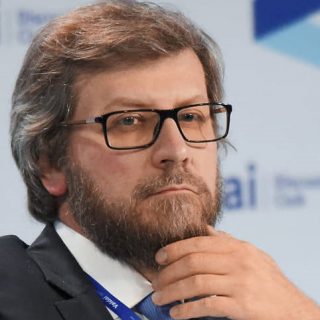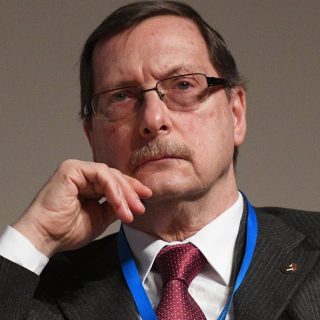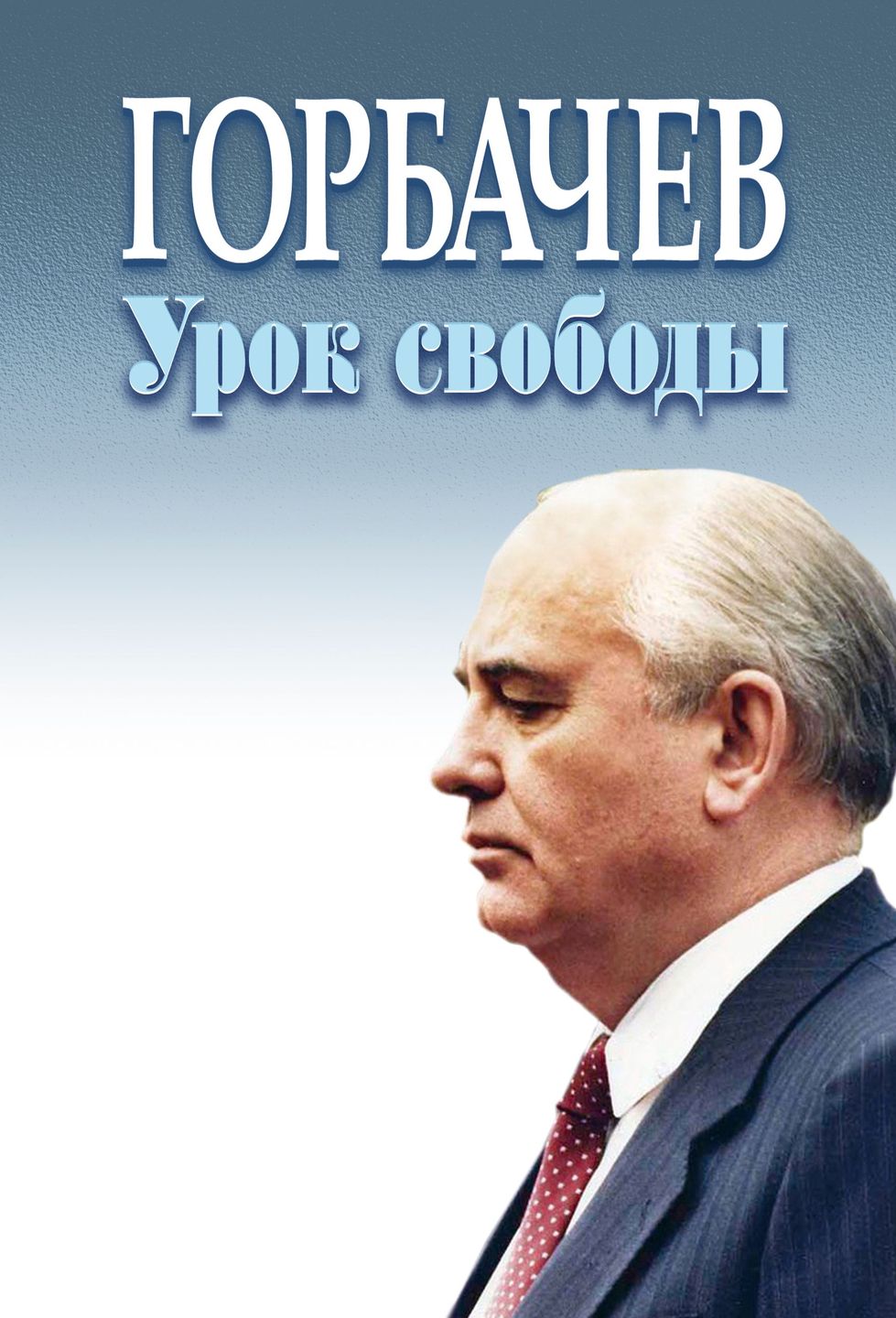Мир перемен. 2024. № 3
Мир перемен. 2024. № 3.
- содержание резюме contents summary
СОДЕРЖАНИЕ
Непонятый пророк
М. Горбачев. Река времени и величие действия
М. Горбачев. Личностные аспекты политики перестройки
Экономика
Г. Толорая, Ф. Чернецкий. Надо ли России выбирать из двух Корей?
Г. Фейгин, С. Пшеничникова, Е. Макеева. Теория мирохозяйственных связей в марксистской политэкономии
А. Пылин. Станет ли ЕАЭС центром Большого Евразийского партнерства?
Х. Гаджиев. Современная Грузия в зеркале своей национальной идеи
С. Черных. Новые ценности в управлении: проблемы и перспективы.
Политика
А. Лукин, В. Лукин. О внешней политике России после украинского кризиса
С. Романенко. М. Горбачев и проблема Югославии (май – декабрь 1991 г.)
В. Тимофеев. Рукопашная схватка и происхождение стратегии
Гражданское общество
А. Ципко. Из воспоминаний старшего научного сотрудника ИЭМСС АН СССР
РЕЗЮМЕ
Г. Толорая, Ф. Чернецкий. Надо ли России выбирать из двух Корей?
В 2023–2024 г. в корейской политике России произошел резкий поворот – оформилось стратегическое партнерство России и КНДР. Впрочем, назвать этот поворот совсем неожиданным нельзя. Еще в конце 1990-х годов стало понятно, что
игнорирование КНДР, избранное в начале десятилетия в качестве рецепта для отношений с этой страной, ослабляет позиции РФ в Азии. С 2000 г. было несколько попыток улучшения отношений, в том числе экономических, между странами. На фоне конфликта на Украине, в котором КНДР полностью встала на сторону России, визит главы КНДР в РФ осенью 2023 г. и встречный визит президента РФ летом 2024-го стали прорывом. Вместе с тем перспективы экономического сотрудничества с КНДР все еще весьма узки.
Однако эти логичные шаги российского руководства вызвали резкую реакцию властей Республики Корея, воспринявших их как внешнеполитическое поражение в своем противостоянии с Севером. Кризис в двусторонних отношениях стал беспрецедентным с момента их установления в 1990 г., связи практически заморожены. Но еще и до этого, с 2014-го, РК присоединилась к санкциям против РФ по украинскому поводу. В результате их неоднократного расширения в 2022–2024 г. объем торговли резко сократился. Сегодня риторика официальных лиц, поддакивающих американским инвективам против России и КНДР, стала враждебной. Однако аккуратный подход к отношениям с РФ, применявшийся властями РК ранее, позволяет надеяться, что нынешнее ухудшение – ситуативное. Геополитические изменения и смены правящих элит могут способствовать быстрому восстановлению части экономического сотрудничества, даже если возможности для политического диалога и не расширятся.
Российской дипломатии необходимо проявлять терпение и взвешенный подход и постараться не отчуждать РК, параллельно развивая отношения с Севером, отводя попытки увязывать политику Кремля в отношении двух независимых стран.
Ключевые слова: КНДР, Республика Корея, Россия, экономическое сотрудничество, санкции.
УДК: 339.92
EDN: COUWVL
DOI: 10.51905/2073–3038_2024_3_20
Георгий Давидович Толорая – профессор, доктор экономических наук, главный научный сотрудник ИКСА РАН, заведующий Центром российской стратегии в Азии ИЭ РАН (г.Москва).
Федор Михайлович Чернецкий – младший научный сотрудник Центра российской стратегии в Азии ИЭ РАН (г.Москва).
Г. Фейгин, С. Пшеничникова, Е. Макеева. Теория мирохозяйственных связей в марксистской политэкономии
В настоящее время продолжается активное переосмысление различных экономических доктрин. Экономическая теория прошла долгий путь эволюции. На определенном этапе появлялись экономические школы, приобретали популярность и (что, очевидно, неизбежно) в какой-то момент подвергались критике. В этом контексте несколько особняком стоит доктрина марксистской политической экономии. Появившись (по крайней мере, в зачаточном состоянии) еще в середине XIX в., эта концепция на протяжении нескольких десятилетий находила как сторонников, так и противников. Однако после 1917 г. эта концепция воспринималась в СССР как некая абсолютная истина.
Марксистская политическая экономия рассматривалась как базовый инструмент для объяснения сущности капиталистической хозяйственной системы. Последующее развитие марксистской доктрины позволяло так или иначе исследовать процессы, характерные и для плановой (социалистической) экономики.
Ключевые слова: мирохозяйственные связи, международная торговля, международное движение капиталов, миросистемный анализ, марксизм, неомарксизм.
УДК: 339.9.01
EDN: EZPBLY
DOI: 10.51905/2073–3038_2024_3_44
Григорий Феликсович Фейгин – доктор экономических наук, профессор кафедры общей экономической теории и истории экономической мысли Санкт-Петербургского государственного экономического университета (СПбГЭУ) (г. Санкт-Петербург).
Светлана Николаевна Пшеничникова – доктор экономических наук, профессор кафедры общей экономической теории и истории экономической мысли СПбГЭУ (г. Санкт-Петербург).
Елена Сергеевна Макеева – кандидат экономических наук, доцент кафедры общей экономической теории и истории экономической мысли СПбГЭУ (г. Санкт-Петербург).
А. Пылин. Станет ли ЕАЭС центром большого евразийского партнерства?
Евразийский экономический союз (ЕАЭС), договор о создании которого был подписан в мае 2014 г., во многом стал следствием мирового финансово-экономического кризиса и реакцией стран региона на свою уязвимость перед внешними (глобальными) шоками. В то же время усиление конкуренции на постсоветском пространстве со стороны внерегиональных участников, прежде всего ЕС и КНР, также стимулировало страны сделать интеграционный выбор.
За прошедшие десять лет ЕАЭС состоялся не только как международная организация региональной интеграции, но и продемонстрировал позитивные интеграционные эффекты для стран-участниц и устойчивость к внешним шокам. В ближайшие годы ставится задача превращения ЕАЭС в один из экономических центров формирования Большого Евразийского партнерства. Однако реализация этой задачи будет зависеть от дальнейшей консолидации этого интеграционного объединения и его адаптивности к процессам геоэкономической фрагментации.
Ключевые слова: ЕАЭС, Большое Евразийское партнерство, интеграция, экономика, внешние шоки, санкции, геоэкономическая фрагментация, торговля и инвестиции.
УДК: 339.924
EDN: KDQUZD
DOI: 10.51905/2073–3038_2024_3_60
Артем Геннадьевич Пылин – кандидат экономических наук, доцент, ведущий научный сотрудник ИЭ РАН (г. Москва).
Х. Гаджиев. Современная Грузия в зеркале своей национальной идеи
Грузия имеет важнейшее значение в геополитических и геоэкономических раскладах постсоветского пространства, которые наряду с прочим затрагивают и интересы России. В то же время трансформационные процессы последних двух десятилетий, обусловленные в немалой степени сложившейся национальной идеей, внесли серьезные коррективы в государственную политику Грузии, создали двойственные тренды и приоритеты. Это актуализирует необходимость выявления целей, принципов и направлений текущего политического курса страны.
В представленной статье исследуются тенденции и особенности политического и экономического развития Грузии, анализируется ее политическая система и позиция на международной арене.
Ключевые слова: Грузия, политическая система Грузии, постсоветские государства, постсоветское пространство, государственная политика Грузии.
УДК: 321.01, 323.2, 339.9
EDN: PBOJQR
DOI: 10.51905/2073–3038_2024_3_73
Ханлар Аляр оглы Гаджиев – кандидат политических наук, старший научный сотрудник Центра постсоветских исследований ФГБУН ИЭ РАН (г. Москва).
С. Черных. Новые ценности в управлении: проблемы и перспективы
В статье рассматриваются теоретические и методологические подходы к трансформации российской модели управления, связанной в первую очередь с переходом к публичному управлению в контексте сотрудничества. Понятие «публичное управление» на законодательном уровне не определено, на уровне властных функций государства оно означает, как правило, государственное (муниципальное) управление. Контекст сотрудничества придает этому понятию более широкое толкование, включающее в себя неформальное (сетевое) управление, прозрачность, соблюдение общественных интересов. Эти, достаточно новые, ценности в управлении в проблемных и перспективных аспектах являются объектом данного исследования, носящего во многом дискуссионный характер.
Ключевые слова: публичное управление, сотрудничество (коллаборация), гражданское общество, «новая власть», сетевое управление, открытость правительств, управленческие решения.
УДК: 338.2
EDN: XFIAIB
DOI: 10.51905/2073-3038_2024_3_99
Сергей Иннокентьевич Черных – доктор экономических наук, профессор, главный научный сотрудник ИЭ РАН (г. Москва).
А. Лукин, В. Лукин. О внешней политике России после украинского кризиса
Эпиграфом к этой статье вполне можно было бы взять высказывание из «Троецарствия» – исторического романа XIV в., авторство которого приписывается Ло Гуаньчжуну: «Великие силы Поднебесной, долго будучи разобщенными, стремятся соединиться вновь и после продолжительного единения опять распадаются – так говорят в народе». Украинский кризис, как и все былые конфликты, рано или поздно, бесспорно, закончится. Попытаемся осмыслить, какой может быть внешняя политика России в посткризисном будущем.
Ключевые слова: Россия, внешняя политика, Запад, Европа, постсоветское пространство
УДК: 327, 338
EDN: TLEFFC
DOI: 10.51905/2073–3038_2024_3_112
Александр Владимирович Лукин – доктор исторических наук, профессор, и. о. научного руководителя Института Китая и современной Азии РАН (г. Москва).
Владимир Петрович Лукин – доктор исторических наук, профессор-исследователь факультета мировой экономики и мировой политики НИУ «Высшая школа экономики» (г. Москва).
С. Романенко. М. Горбачев и проблема Югославии (май – декабрь 1991 г.)
Статья представляет собой фрагмент более обширного исследования автора, опубликованного в коллективной монографии «Распад Югославии: тридцать лет спустя», вышедшей в 2024 г. В журнальный вариант автором внесены небольшие изменения.
В материале много ранее неопубликованных документов из архива Горбачев-фонда. Эта публикация, как и монография в целом, позволяет по-новому взглянуть на позицию СССР по отношению к событиям в Югославии в 1991 г., в частности на трактовку М. Горбачевым соотношения развития событий в СССР и СФРЮ как многонациональных социалистических федераций, на возможные варианты судьбы СФРЮ, на роль дезинтеграционных процессов в этих двух государствах в развитии международной ситуации после окончания холодной войны и на влияние отдельных государств и международных организаций на будущее Югославии.
Ключевые слова: СССР, СФРЮ, М. Горбачев, А. Маркович, С. Милошевич, Ф. Туджман, реформаторство, национальное самоопределение, распад многонационального государства, конфедерация.
УДК: 93/94; 321; 323.1
EDN: UWWCEB
DOI: 10.51905/2073–3038_2024_3_126
Сергей Александрович Романенко – доктор исторических наук, профессор РГГУ, заведующий сектором Восточной Европы отдела Европы и Америки ИНИОН РАН (г. Москва).
В. Тимофеев. Рукопашная схватка и происхождение стратегии
Антропологические и психологические исследования роли физического противоборства в эволюции человека делают акцент на анализе смешанных единоборств. А в некоторых культурологических и даже политологических научных работах боевые искусства рассматриваются в контексте социальных и политических процессов. Однако в рамках политических исследований практически не изучается вопрос развития стратегии в свете рукопашного боя, который гипотетически должен был влиять на развитие идей о войне.
Согласно гипотезе настоящего исследования, рукопашный бой и войну объединяет общий принцип. Цель статьи – проследить переход от рукопашного боя к дальнейшему развитию стратегии.
Автор делает следующие выводы. Во-первых, проблема достижения асимметрии потенциалов наблюдается уже на уровне рукопашного боя и вызывает к жизни принцип наименьшего действия, который ее и разрешает. Во-вторых, принцип наименьшего действия и, как следствие, сам рукопашный бой, который выражает его, являются актуальными практически во всех вооруженных конфликтах.
Ключевые слова: рукопашный бой, принцип стратегии, военная история, UFC, Сунь-Цзы, Карл фон Клаузевиц, Ганс Дельбрюк, Джулио Дуэ, БПЛА.
УДК: 327.5
EDN: WYEPZE
DOI: 10.51905/2073–3038_2024_3_148
Владимир Владимирович Тимофеев – кандидат политических наук, старший преподаватель кафедры общественных наук Санкт-Петербургского государственного университета промышленных технологий и дизайна (г. Санкт-Петербург).
А. Ципко. Из воспоминаний старшего научного сотрудника ИЭМСС АН СССР (1972–1986)
Посвящается памяти директора ИЭМСС АН СССР академика О. Т. Богомолова. Институт экономики мировой социалистической системы (ИЭМСС) АН СССР был создан в 1960 г. как основной центр по изучению экономических, политических и внешнеполитических проблем социалистических стран. В 1991 г. переименован в Институт международных экономических и политических исследований (ИМЭПИ) РАН. О. Т. Богомолов руководил институтом с 1969 по 1998 г. В 2005 г. решением президиума РАН Институт экономики (ИЭ) РАН и ИМЭПИ РАН были реорганизованы путем слияния в единую научную организацию – ИЭ РАН. В июне 2025 г. ИЭ РАН будет отмечать 95-летие.
После моей месячной командировки в Прагу от редакции «Комсомольской правды» летом 1967 г. я был до глубины души заражен идеями «пражской весны» и все же надеялся, что и у нас, в СССР, когда-нибудь тоже кончится этот бесконечный маразм. После Праги, знакомства и с О. Шиком, и с идеологами «пражской весны» К. Косиком и Р. Рихтой вопросы теории социализма стали предметом моих раздумий. Сама идея построить другой социализм, демократический, не похожий на то, что было в СССР, была заманчивой.
Ключевые слова: «пражская весна», польская «Солидарность», ИЭМСС АН СССР
УДК: 330.85
EDN: XJHUYY
DOI: 10.51905/2073–3038_2024_3_167
Александр Сергеевич Ципко – доктор философских наук, главный научный сотрудник ИЭ РАН (г. Москва).
Contents
The Misunderstood Prophet
(From the Speeches of M. Gorbachev)
M. Gorbachev. The River of Time and the Greatness of Action
M. Gorbachev. Personal Aspects of the Perestroika Policy
Economics
G. Toloraya, F. Chernetskii. Should Russia Choose between the Two Koreas?
G. Feigin, S. Pshenichnikova, E. Makeeva. The Theory of World Economic Relations in Marxist Political Economy
A. Pylin. Will the EAEU Become the Center of the Greater Eurasian Partnership?
K. Gadzhiev. Modern Georgia through the Mirror of its National Idea
S. Chernykh. New Values in Management: Problems and Prospects
Politics
A. Lukin, V. Lukin. On Russia’s Foreign Policy after the Ukrainian Crisis
S. Romanenko. Mikhail Gorbachev and the Yugoslav Problem (May-December1991)
V. Timofeev. Hand-to-Hand Combat and the Origins of Strategy
Civil Society
A. Tsipko. From the Memoirs of a Senior Researcher at the IEMSS Academy of Sciences of the USSR (1972–1986)
Summary
M. Gorbachev. The River of Time and the Greatness of Action (Speech in Fulton, Missouri, May 7, 1992)
Annotation. Over 46 years ago, W. Churchill delivered a famous speech here, which was perceived in my country as a formal declaration of the Cold War. Indeed, the words “iron curtain” were uttered there for the first time and an appeal was made to the entire Western world to rally against the threat of tyranny in the face of the Soviet Union and communist expansion. Everything else in this speech, including the analysis of the world post–war situation, thoughts about the possibility of preventing a third World war, about the prospects for progress, about methods of arranging the post-war world – all this remained unknown to the Soviet people. Now, paying tribute to this outstanding statesman, we can calmly and objectively assess both the merits of that speech and the limitations of the analysis, ideas and forecasts contained in it, and strategic attitudes. Since then, the world we live in has undergone profound changes.
Keywords. Churchill’s Fulton speech, the Cold War, international relations, historical choice, national interests, disarmament, new thinking, perestroika, ecology, multipolar world.
Michael S. Gorbachev – General Secretary of the Central Committee of the CPSU, the first and last President of the USSR (Moscow).
M. Gorbachev. Personal Aspects of the Perestroika Policy (Speech at Harstad University College, Norway, May 1998)
Annotation. The organizers of the meeting asked me a question: what kind of strong-willed decision was required of me to end the cold war? The question is multi-layered. The decisions were not made suddenly. I ended up at the head of the party and the state, having gone a long way in life and politics before that. I already had a good idea of the state of the country.
The administrative command system, which played a certain role as a factor in mobilizing resources for industrialization and repelling aggression, became a brake on development. The economy was focused primarily on justifying ideological dogmas and rivalry with the West. A significant part of the national income was spent on armaments. By seeking militarystrategic parity, we undermined the country’s strength and depleted its resources. The problems of the arrangement were solved slowly.
Keywords. cold War, perestroika, USSR economy, foreign policy, iron curtain, disarmament, Reagan, SOY, charter for Europe, new thinking.
Michael S. Gorbachev – General Secretary of the Central Committee of the CPSU, the first and last President of the USSR (Moscow).
G. Toloraya, F. Chernetskii. Should Russia Choose between the Two Koreas?
Annotation. In 2023–2024, Russia’s Korean policy took a sharp turn – the strategic partnership between Russia and the DPRK took shape. It cannot be called totally unexpected, though – as long ago as in the late 1990s it became clear that ignoring the DPRK, since the beginning of the decade used as a recipe for relations with this country, weakened the positions of the Russian Federation in Asia. Since 2000, there have been several attempts to improve relations (including economic ones) between the two countries. Against the background of the conflict in Ukraine, in which the DPRK completely sided with Russia, the visit of the head of the DPRK to Russia in the fall of 2023 and the return visit of the President of the Russian Federation in the summer of 2024 signaled a breakthrough. At the same time, the prospects for economic cooperation with the DPRK are still dim. These logical steps by Russian leadership, however, unexpectedly, caused a sharp reaction from the authorities of the Republic of Korea, who perceived it as a diplomatic defeat in their confrontation with the North. The crisis in bilateral relations has become unprecedented since their establishment in 1990, and ties are practically frozen. But even before that, since 2014, ROK joined the sanctions against the Russian Federation for reason of Ukraine situation. As a result of their repeated expansion in 2022–2024, the volume of trade has sharply decreased. Today, the rhetoric of officials who concur with American invectives against Russia and the DPRK, has become hostile. However, the careful approach to relations with the Russian Federation, used by the authorities of the ROK earlier, allows us to hope that the current deterioration is situational. Geopolitical changes and changes in the ruling elites can contribute to the rapid restoration of a part of economic cooperation, even if the opportunities for a political dialogue may not emerge. Russian diplomacy needs to show patience and a balanced approach and try not to alienate the ROK, while simultaneously developing relations with the North, avoiding attempts to link its relations to the two independent countries.
Keywords: DPRK, Republic of Korea, Russia, Russia-Korea economic cooperation, sanctions
Georgy D. Toloraya – Doctor of Science, Professor, Director, The Center of Russian Strategy in Asia, Institute of Economics of the Russian Academy of Sciences (Moscow).
Fedor M. Chernetskii – Junior Researcher, The Center of Russian Strategy in Asia, Institute of Economics of the Russian Academy of Sciences (Moscow).
G. Feigin, S. Pshenichnikova, E. Makeeva. The Theory of World Economic Relations in Marxist Political Economy
Annotation. Currently, there is an active rethinking of various economic doctrines. Economic theory has come a long way in its evolution. At a certain stage, economic schools appeared, gained popularity and (which is obviously inevitable), at some point they were criticized. In this context, the doctrine of Marxist political economy stands somewhat apart. Having appeared (at least in its infancy) Back in the middle of the 19th century, this concept found both its supporters and opponents for several decades. However, after 1917 this concept was perceived in the USSR as a kind of absolute truth. Marxist political economy was considered as a basic tool for explaining the essence of the capitalist economic system. The subsequent development of the Marxist doctrine allowed one way or another to explore the processes characteristic of the planned (socialist) economy.
Keywords: World economic relations, international trade, international capital movement, world system analysis. Marxism, Neo-Marxism.
Grigory F. Feigin – Doctor of Economics, Professor of the Department of General Economic Theory and History of Economic Thought at St. Petersburg State University of Economics (SPbGEU) (St. Petersburg).
Svetlana N. Pshenichnikova – Doctor of Economics, Professor of the Department of General Economic Theory and History of Economic Thought at SPbGEU (St. Petersburg).
Elena S. Makeeva – Candidate of Economic Sciences, Associate Professor of the Department of General Economic Theory and History of Economic Thought at SPbGEU (St. Petersburg).
A. Pylin. Will the EAEU Become the Center of the Greater Eurasian Partnership?
Annotation. The Eurasian Economic Union (EAEU), the agreement on the establishment of which was signed in May 2014, was largely a consequence of the global financial and economic crisis and the reaction of the countries of the region to vulnerability to external (global) shocks. At the same time, increased competition in the post-Soviet space from non-regional participants (primarily the EU and China) also stimulated countries to make integration choice. Over the past ten years, the EAEU has been established not only as an international organization of regional integration, but also demonstrated positive integration effects for the participating countries and its resistance to external shocks. In the coming years, the task is to turn the EAEU into one of the economic centers for the formation of the Greater Eurasian Partnership. However, the implementation of this task will depend on the further consolidation of this integration association and its adaptability to the processes of geoeconomic fragmentation.
Keywords: EAEU, Greater Eurasian Partnership, integration, economy, external shocks, sanctions, geoeconomic fragmentation, trade and investment.
Artem G. Pylin – Cand. Sci. (Econ.), Associate Professor, Leading Researcher at the Institute of Economics of the Russian Academy of Sciences, (Moscow).
K. Gadzhiev. Modern Georgia through the Mirror of its National Idea
Annotation. Georgia has extremely significant impact on geopolitical and geo-economic alignments of the post-Soviet space, which, among other things, affect the interests of Russia. At the same, time transformational processes of the past two decade formed to a large extent by the developed national idea, have made serious adjustments to the Georgia’s state policy, created ambivalent trends and priorities in it. All that has been said actualizes the need to identify goals, principles and directions of the country’s current political course. To this end, this article investigates tendencies and features of Georgia’s political and economic development, analyzes its political system and position on the international arena.
Keywords: Georgia, Georgia’s political system, post-Soviet states, post-Soviet space, Georgia’s state policy.
Khanlar A. Gadzhiev – Candidate of Political Sciences, Senior Researcher of the Center for Post-Soviet Studies, Institute of Economics of the Russian Academy of Sciences (IE RAS)
S. Chernykh. New Values in Management: Problems and Prospects
Annotation: The article discusses theoretical and methodological approaches to the transformation of the Russian management model, which is primarily associated with the transition to public administration in the context of cooperation. The concept of «public administration» is not defined at the legislative level, at the level of state power functions it means, as a rule, state (municipal) administration. The context of cooperation gives this concept a broader interpretation, including informal (network) management, transparency, and respect for public interests. These fairly new values in management in problematic and promising aspects are the object of this study, which is largely debatable.
Keywords: public administration, cooperation (collaboration), civil society, «new power», network governance, openness of governments, management decisions.
Sergey I. Chernykh – Doctor of Economic Sciences, Professor, Chief Researcher at the Institute of Economics of the Russian Academy of Sciences (Moscow).
A. Lukin, V. Lukin. On Russia’s Foreign Policy after the Ukrainian Crisis
Annotation. This article examines the possible future trajectory of Russia’s foreign policy in the aftermath of the Ukrainian crisis. It contends that Russia’s current situation – considering its economic and human resources, along with the imperative for economic development – will inevitably guide it back to a course shaped by its historical and geographical context. This path envisions Russia as a Eurasian power, actively engaging with both Europe and Asia. To follow this direction, Moscow will need to gradually reestablish constructive cooperation with both Western and Eastern Europe in certain areas, without abandoning its “Pivot to Asia” strategy. Additionally, Russia will need to enhance its influence in the post-Soviet region, leveraging its strategic position on the Eurasian continent for its own advantage. Adopting this balanced approach is essential if Russia seeks to retain its status as a significant global player.
Keywords: Russia, foreign policy, the West, Europe, Post-Soviet space.
Alexander V. Lukin – Doctor of History, acting academic head of the Institute of China and Contemporary Asia of the Russian Academy of Sciences (Moscow).
Vladimir P. Lukin – Doctor of History, is research professor at the Faculty of World Economy and International Affairs of HSE University (Moscow).
S. Romanenko. Mikhail Gorbachev and the Yugoslav Problem (May-December 1991)
Annotation: The article is a fragment of the author’s more extensive research published in a collective monograph, The Breakup of Yugoslavia: Thirty Years Later, published in 202449. The author has made minor changes and corrections to the magazine version The material includes many previously unpublished documents from the archive of the Gorbachev Foundation. This publication, as well as the monograph as a whole, allows a new look at the position of the USSR in relation to the events in Yugoslavia in 1991, in particular – at M.S. Gorbachev’s interpretation of the correlation between the development of events in the USSR and the SFRY as multinational socialist federations, at possible variants of the fate of the SFRY, at the role of disintegration processes in these two states in the development of the international situation after the end of the Cold War and at the influence of individual states and international organizations on the future of Yugoslavia.
Keywords: USSR, SFRY, M. Gorbachev, A. Markovic, S. Milosevic, F. Tudjman, reformism, national self-determination, dissolution of the multinational state, confederation.
Sergey A. Romanenko – ScD in History, Professor, Russian State University of Humanities Head of Sector, INION RANDoctor of Historical Sciences, , Head of the Eastern Europe Section of the Europe and America Division of INION RAS (Moscow).
V. Timofeev. Hand-to-Hand Combat and the Origins of Strategy
Annotation. This article analyzes how physical force confrontation has evolved into modern warfare. Certain Cultural and Political Science studies consider martial arts in the context of social and political processes. Moreover, anthropological and psychological studies focus on the analysis of mixed martial arts in the study of human evolution. Nevertheless, political studies hardly study the development of strategy with regard to hand-to-hand combat, which is hypothesized to influence the development of ideas about warfare. Hand-to-hand combat is generally neglected when analyzing the history of strategy and especially when studying modern warfare. The hypothesis of the research states that hand-to-hand combat and war share the common principle. The goal of this research work is to indagate the transit from hand-to-hand combat to the further development of strategy. The literature review resulted in the derivation of the principle of least action as a principle of warfare. The methodology involves analyzing the hand-to-hand combat of the mixed martial arts format under UFC rules as a model of physical force confrontation. The quantitative method is finding the percentage of knockouts/technical knockouts (KOs/TKOs) from the number of fights in each UFC event and generating a histogram describing the frequencies of the percentages. The author also finds the confidence interval and the most probable number for KOs/TKOs in fights. The qualitative method is based upon interpreting the results within the framework of military history. The author draws the following conclusions. Firstly, the problem of achieving the asymmetry of capacities can be found in hand-tohand combat and is solved by the principle of least action. Secondly, the principle of least action and, as a consequence, the hand-to-hand combat itself, which expresses it, are relevant in virtually all wars. In addition, both hand-to-hand combat and the principle described are topical in contemporary politics.
Keywords: hand-to-hand combat, principle of strategy, military history, UFC, Carl von Clausewitz, Hans Delbrück, Giulio Douhet, UAV.
ORCID: 0000–0003–1714–3406,
ResearcherID: HTS-8043–2023
Vladimir V. Timofeev – PhD in Political Science, Senior Lecturer, Department of Social Sciences, Saint Petersburg State University of Industrial Technologies and Design (Saint Petersburg).
A. Tsipko. From the Memoirs of a Senior Researcher at the IEMSS Academy of Sciences of the USSR (1972–1986)
Annotation. After my month-long business trip to Prague from the editorial office of Komsomolskaya Pravda in the summer of 1967. I was deeply infected with the ideas of the Prague Spring, and yet I hoped that one day in the USSR this endless insanity would also end. After Prague, meeting both O. Shik and the ideologists of the Prague Spring, K. Kosik and R. Richta, questions of the theory of socialism became the subject of my thoughts. The very idea of building a different socialism, a democratic one, unlike what was in the USSR, was tempting.
Keywords: «Prague Spring», Polish Solidarity, IEMSS Academy of Sciences of the USSR.
Alexander S. Tsipko – Doctor of Philosophical Sciences, Chief Researcher at the Institute of Economics of the Russian Academy of Sciences (Moscow).

